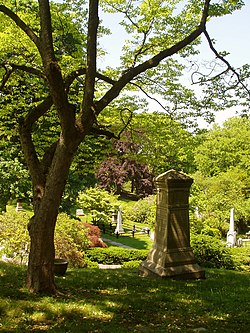Mount Auburn Cemetery
|
Mount Auburn Cemetery
|
|

Mount Auburn Cemetery
|
|
| Location | Cambridge and Watertown, Massachusetts |
|---|---|
| Coordinates | 42°22′14″N 71°8′45″W / 42.37056°N 71.14583°WCoordinates: 42°22′14″N 71°8′45″W / 42.37056°N 71.14583°W |
| Built | 1831 |
| Architect | Alexander Wadsworth; Dr. Jacob Bigelow |
| Architectural style | Exotic Revival, Other, Gothic Revival |
| NRHP Reference # | 75000254 |
| Significant dates | |
| Added to NRHP | April 21, 1975 |
| Designated NHLD | May 27, 2003 |
Mount Auburn Cemetery is the first rural cemetery in the United States, located on the line between Cambridge and Watertown in Middlesex County, Massachusetts, 4 miles (6.4 km) west of Boston.
With classical monuments set in a rolling landscaped terrain, it marked a distinct break with Colonial-era burying grounds and church-affiliated graveyards. The appearance of this type of landscape coincides with the rising popularity of the term "cemetery", derived from the Greek for "a sleeping place." This language and outlook eclipsed the previous harsh view of death and the afterlife embodied by old graveyards and church burial plots.
The 174-acre (70 ha) cemetery is important both for its historical aspects and for its role as an arboretum. It is Watertown’s largest contiguous open space and extends into Cambridge to the east, adjacent to the Cambridge City Cemetery and Sand Banks Cemetery. It was designated a National Historic Landmark District in 2003 for its pioneering role in 19th-century cemetery development.
The land that became Mount Auburn Cemetery was originally named Stone's Farm, though locals referred to it as "Sweet Auburn" after the 1770 poem "The Deserted Village" by Oliver Goldsmith. Mount Auburn Cemetery was inspired by Père Lachaise Cemetery in Paris and was itself an inspiration to cemetery designers, most notably at Abney Park in London. Mount Auburn Cemetery was designed largely by Henry Alexander Scammell Dearborn with assistance from Jacob Bigelow and Alexander Wadsworth.
...
Wikipedia


